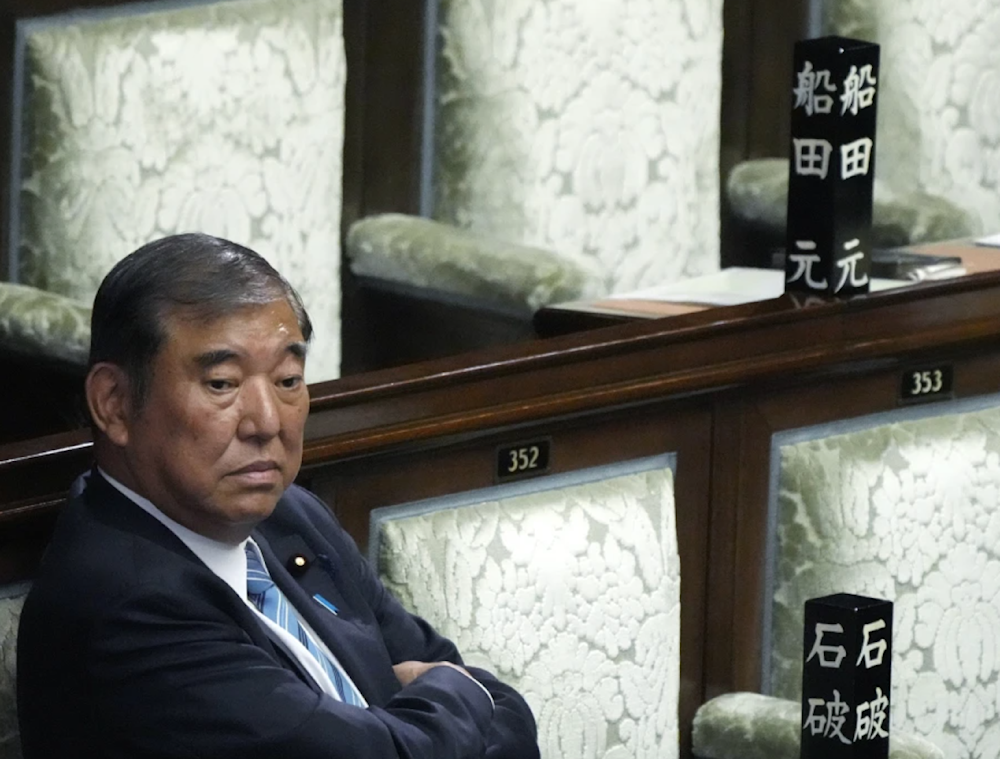Ishiba re-elected as Japan’s PM
Ishiba, 67, succeeds Fumio Kishida, who resigned in September following a series of scandals that harmed public faith in the Liberal Democratic Party.
-

Japanese Prime Minister Shigeru Ishiba waits after the first vote for a new prime minister at a special parliamentary session of the lower house on November 11, 2024. (AP)
Japanese Prime Minister Shigeru Ishiba was re-elected on November 11, 2024, despite his ruling coalition suffering a major setback in the previous month’s emergency election.
The election results marked the coalition's biggest loss in nearly a decade, as they lost their majority in the lower house of parliament.
Ishiba, 67, succeeded Fumio Kishida, who resigned in September amid scandals that eroded public trust in the Liberal Democratic Party (LDP).
Ishiba quickly called a lower house election in October to confirm his mandate. However, instead of strengthening his position, he faced a significant defeat, as voter frustration over rising prices and a slush fund scandal dealt the ruling coalition its worst performance since 2009.
Despite the setback, Ishiba secured a win in the first parliamentary runoff vote in 30 years, defeating Democratic Party leader Yoshihiko Noda by a margin of 221 to 160. With this victory, Ishiba now leads a minority government, facing a strengthened opposition.
In the aftermath, he reappointed most of his cabinet members, stressing that his top priority is ensuring Japan "is a peaceful nation and people's livelihoods improve."
Smaller parties performed well in Tokyo elections
Ishiba had vowed not to actively support LDP members implicated in a funding scandal that resulted in his predecessor Fumio Kishida's downfall. However, the opposition capitalized on media reports indicating that the party had allocated 20 million yen ($132,000) to district offices managed by these individuals, who still participated in the election.
"Voters chose which party would be the best fit to push for political reforms," former premier Yoshihiko Noda stated late last month, adding that the "LDP-Komeito administration cannot continue."
Reflecting trends seen in elections elsewhere, smaller parties also performed well. Reiwa Shinsengumi, founded by a former actor, tripled its seats to nine, campaigning on promises to abolish the sales tax and enhance pensions. The newly established Conservative Party of Japan, which focuses on anti-immigration and traditionalist policies and was founded by nationalist writer Naoki Hyakuta in 2023, secured its first three seats.
The number of women in the legislature reached a record high of 73, according to NHK.
Ishiba had committed to revitalizing struggling rural areas and addressing Japan's declining population through family-friendly initiatives like flexible working hours. However, he moderated his stance on various issues, including allowing married couples to use separate surnames. He also supported the creation of a regional military alliance similar to NATO meant to contain China, while cautioning that such an initiative "would not happen overnight."

 3 Min Read
3 Min Read








